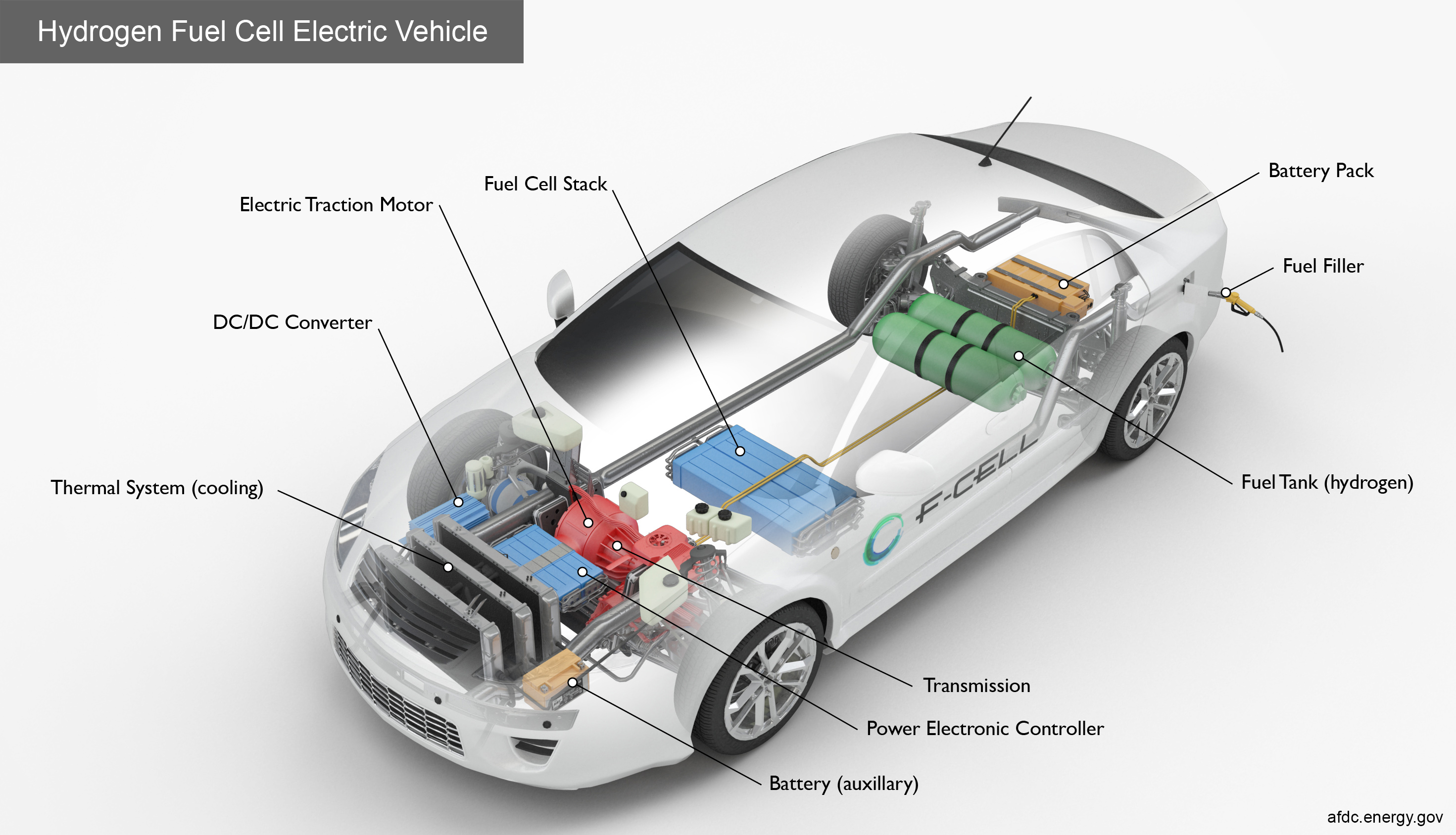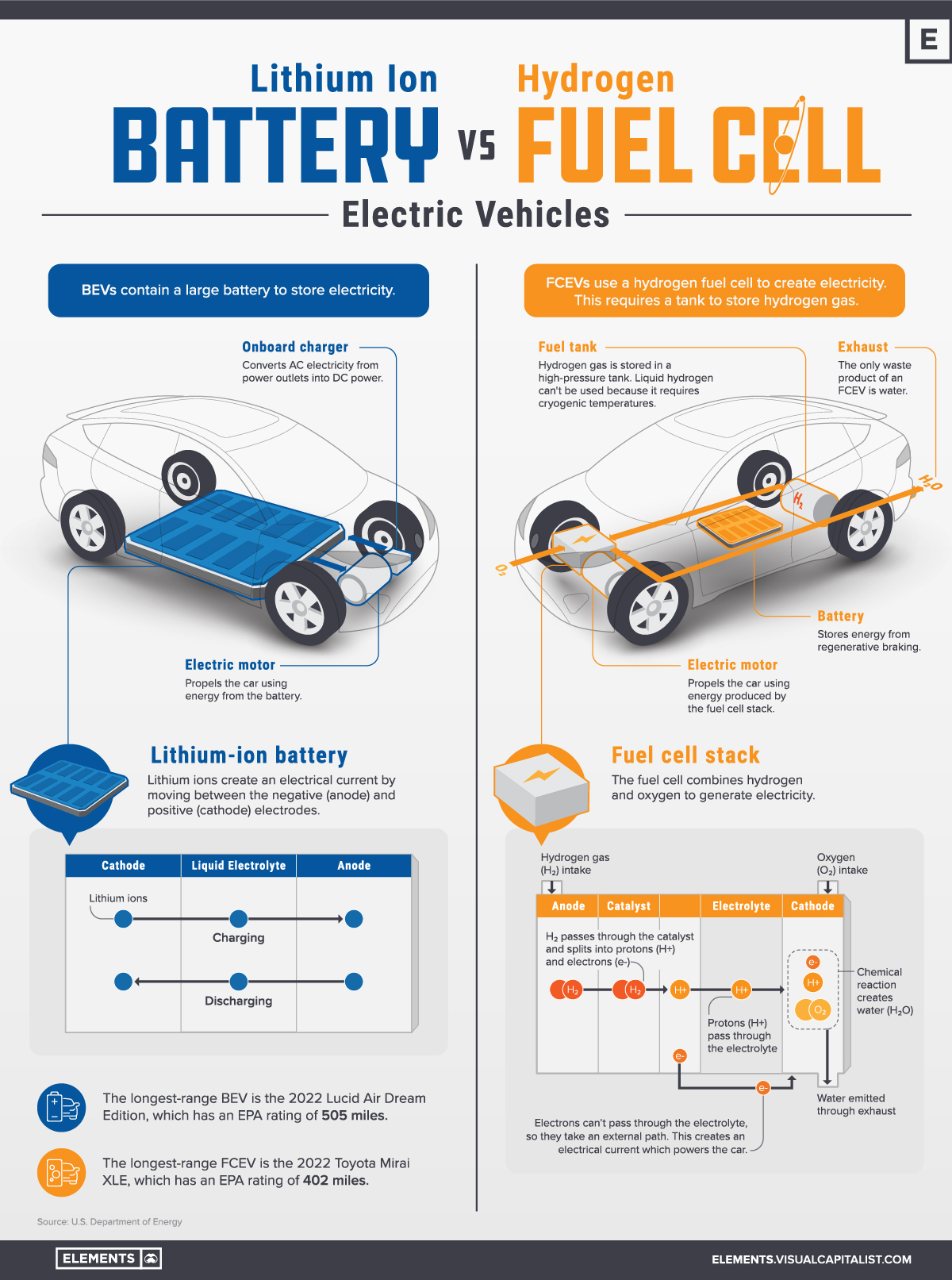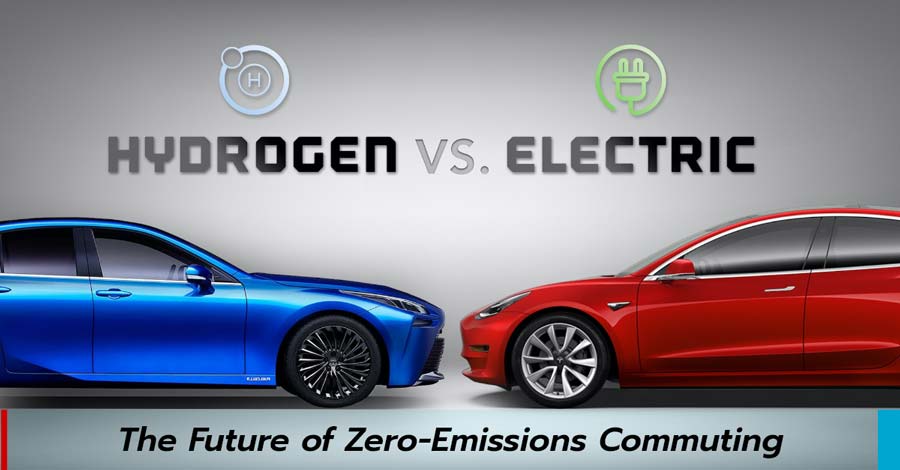The battle lines have been drawn in the automotive world as two titans of green technology vie for supremacy: Hydrogen fuel cell vehicles and electric vehicles. But which truly earns the mantle of Car of the Future? We’re diving under the hood and behind the wheel to comprehensively compare these two eco-friendly gladiators. Buckle up and keep your emissions low – this is not just about miles per gallon, but a potential revolution in how we propel ourselves down the road.
What are Hydrogen Fuel Cell Vehicles?

Hydrogen fuel cell vehicles are a somewhat mysterious prospect to many car enthusiasts. They’re often lumped into the electric vehicle (EV) category, but in reality, they are a breed apart, albeit with some shared traits. So how do they work? These chimeric chariots harness the power of science’s lightest element, hydrogen, in a process known as a fuel cell reaction.
To simplify, imagine it as a sort of continuous, on-board battery recharging system. The vehicle stores compressed hydrogen gas, which is then allowed to react within the fuel cell with oxygen in the ambient air. The magic begins in the fuel cell where hydrogen atoms split into protons and electrons. The electrons, denied the easy path due to the presence of a catalyst layer, are forced to travel through an external circuit, providing electric current that drives the vehicle motors.
The protons, on the other hand, breeze along a membrane, meeting their electron cousins and outside oxygen on the other end of the party to produce water, the only exhaust substance of the fuel cell reaction. Yes, water, that precious room-temperature liquid we all love. This is where hydrogen fuel cell vehicles earn their clean-energy spurs.
One advantage over traditional combustion engines is immediate: no particulate emissions, no CO2, no smog-contributing pollutants. This is a vehicle that, theoretically, you could drink the by-product from. Not that it’s recommended, mind you; it’s simply an illustration of the environmental potential hydrogen fuel cell technology offers.
In terms of mechanical intricacies, hydrogen fuel cell vehicles are less complex than their traditional gasoline counterparts. They essentially have one moving part in the powertrain – the electric motor. Although sharing this characteristic with conventional EVs, the key difference lies in the ‘refueling’ process and infrastructure, a topic that will be addressed more comprehensively later in this piece.
In brief, hydrogen fuel cell vehicles, much like your conventional cars, can be refueled at a station, albeit a hydrogen one, in a couple of minutes, while EVs typically require a significantly longer span hooked to an electric power source. This could make hydrogen vehicles more appealing for those inflicted with range anxiety or those who lack home charging solutions.
Ultimately, a hydrogen fuel cell car is an electric vehicle, but one that produces its electricity on board and emits only water. Together these elements put the hydrogen fuel cell vehicles into a unique, somewhat futuristic class of their own. But whether they are spaced-out science on wheels or the real-world answer to our environmental woes is a debate we shall, indeed, delve into further along in this article.
Understanding Electric Vehicles

To fully grasp the dynamics at play in the world of electric vehicles (EVs), it’s imperative to understand what they fundamentally are and how they function. In simplest terms, an electric vehicle uses one or more electric motors for propulsion, powered by energy stored in rechargeable batteries. This is in stark contrast to traditional vehicles which rely on internal combustion engines and gasoline or diesel fuel.
The complexity of an EV boils down to the battery technology, which determines crucial factors such as the driving range, charging time, and overall life-cycle. Most EVs use lithium-ion batteries, much like your everyday cell phone, but significantly larger and more high-powered.
The mechanics of an EV are comparatively less complicated than those of an internal combustion engine vehicle, a feature that contributes to lower maintenance costs. Electric motors have fewer moving parts, reducing the risk of mechanical breakdown. Due to regenerative braking, a process where the motor also serves as a generator to recover energy during braking, the brake system in an EV typically lasts longer.
Charging an EV can be as easy as plugging it into a socket at your residence. However, home charging typically has a lower power supply, extending the charging time. For faster charging times, public charging stations or superchargers, akin to traditional gas stations but specifically for EVs, are available.
In terms of cost efficiency, EVs generally have a higher upfront cost but promise substantial savings in the long run. The electricity required to power an EV can cost less than half of what it would take to fuel a gasoline car, depending on local utility rates. Additionally, government incentives for EV purchases lend to their affordability.
Overall, EVs offer a significant departure from traditional automotive technology, bringing with them a different set of pros and cons. They excel in areas like operational efficiency, reduced emissions, and low running costs, making them a profound player in the equation of future transportation.
Comparing Hydrogen Fuel Cell Vehicles and Electric Vehicles

As we delve into the throes of comparing hydrogen fuel cell vehicles (HFCVs) and electric vehicles (EVs), one thing becomes quite clear: this is not just a car chatter but a sophisticated debate on our future transportation.
At the heart of the discussion lies the elementary question: How exactly are they powered? HFCVs, those vehicular paragons of clean energy, run on the simplest element known to us, hydrogen. They create electricity by the fusion of hydrogen and oxygen inside a fuel cell. Neat, right? Streamlined and green, these cars only emit water vapors, leaving not a trace of remorse on our planet’s chest.
EVs, on the other hand, draw their power right out of batteries which are charged through an electrical grid. You plug in, juice up, and drive off. It’s your childhood remote control car idea re-conceptualized into a bigger, fancier adult play-thing.
However, the ongoing comparison isn’t that simple- it’s much like choosing between a toothy steak and a succulent lobster, both have their allure and setbacks. Range and refueling time are the battleground here. The average EV might get you from Nashville to Memphis on a single charge while a hydrogen fuel cell vehicle will propel you all the way to New Orleans on a sole tank of high-pressure hydrogen – all while singing the tune of non-existent greenhouse gases.
When it comes to restoring the juice, EVs have a tendency of taking their sweet time – a standard voltage outlet might turn it into an overnight affair. Meanwhile, HFCVs refuel at lightning speed – a couple of minutes and you’re ready to hit the road again.
But, let’s not rush to crown a champion yet. Infrastructure plays a critical role in our road-powered saga. With abundant charging stations, EVs seem to have drawn a lot in their favor. HFCVs, however, glare at a sparse hydrogen refueling landscape that could partially eclipse their range advantage.
Moreover, the source of energy is a subject of consideration. While EVs draw their power from a diverse energy mix including renewables, natural gas, and coal, HFCVs tend to rely heavily on natural gas to produce hydrogen. This cognitive twist dapples a slight shade of grey onto HFCVs’ otherwise impeccably green waistcoat.
The final verdict? Well, it isn’t black or white, more of a sustainable shade of greenery. The electrifying charm of EVs takes on the refreshing purity of HFCVs — and we are caught in the middle, spectators to a fascinating green energy derby.
Advantages of Hydrogen Fuel Cell Vehicles Over EVs

When it comes to high fiving GMC Yukons because you’ve managed to pass them at the fuel pump, hydrogen fuel cell vehicles (FCVs) certainly take the trophy. Their main advantage? Quick refueling times. Forget the charging stations where you loiter around for hours to regain your EV’s full potential, hydrogen fuel cell vehicles can be refueled in a matter of minutes, equivalent to traditional gasoline or diesel vehicles.
Moreover, hydrogen is everywhere, and it’s sustainable. We’re not simply scratching the surface of the earth for it – we’re extracting it from an element that covers 70% of our planet: water. This means that the raw material for hydrogen fuel is almost inexhaustible, offering a great prospect for long-term energy supply.
Ah, the joy of riding long distances without the EV range anxiety dangling over one’s head! Hydrogen fuel cell vehicles have longer range than most electric vehicles. Take the Toyota Mirai, for example. It stands proud, with a range of approximately 300 miles on a full hydrogen tank – much farther than many EVs can boast on an equivalent charge.
You’re an owner of a vehicle, not a stress ball, right? FCVs offer peace of mind in terms of battery deterioration. They do not rely on a battery pack for power like traditional EVs. Over time, EVs might see a decrease in their range as the battery pack degrades, whereas fuel cell vehicles maintain their range since the fuel cell stack does not degrade in the same manner.
Last but not least, do you own the road in winter weather conditions? FCVs don’t feel a chill – cold temperatures have little effect on their range and performance, unlike EVs that tend to lose considerable range in freezing climates.
In the grand auto chessboard, while hydrogen fuel cell vehicles might seem like knights overshadowed by the EV rooks and queens, they have neat tricks up their sleeve that certainly call for a second glance. Pausing at the charger might not be your pit stop after all.
Drawbacks of Hydrogen Fuel Cell Vehicles

Indeed, the allure of hydrogen power and its potential to greatly reduce our carbon footprint cannot be overstated. However, hydrogen fuel cell vehicles carry with them a few deficits that may hamper their race to dethrone electric vehicles.
Largely, the most considerable hindrance to the adoption of hydrogen fuel cell vehicles is the infrastructure – or more accurately, the lack thereof. Gas stations stocking up on hydrogen fuel are few and far between, making long-distance travel, on a whim, less convenient compared to EVs. The infrastructure to produce, transport and store hydrogen efficiently and safely is still in its initial phase, with costs and practicalities potentially slowing the fugitive transition to hydrogen fuel cell technology.
Then there’s the issue of efficiency driven by simple laws of physics and chemistry. The process necessary to generate electricity using hydrogen is packed with energy losses that prove costly, both in terms of efficiency and price. It begins with producing hydrogen, usually through natural gas reforming or electrolysis, waged with inherent energy loss. Then, the conversion of hydrogen back into electricity within the fuel cell is less efficient than an EV’s direct use of electricity.
From a financial perspective, hydrogen vehicles aren’t exactly winning brownie points either. At present, they come with a hefty initial cost. While you could argue that this is a new technology, and costs will come down as it matures and scales up, the same argument applies even more so to EVs which are already further along that path.
In terms of green credentials too, the picture is not as rosy as it seems. The majority of commercially accessible hydrogen is not produced from renewable sources, but from natural gas, which contributes to greenhouse gas emissions.
In essence, while the idea of creating energy with the universe’s most abundant molecule is tempting, the drawbacks of hydrogen fuel cell vehicles may obfuscate its potential. These hurdles in terms of infrastructure, efficiency, cost, and the green factor, all pose challenges that may place them a step behind electric vehicles.
Future Prospects: Hydrogen VS Electric

As we venture deeper into the realm of future developments, one can’t help but analyze the prospects of hydrogen and electric vehicles. It’s like a high-stakes poker game, where significant players in the auto industry place bets on what they believe is the future of automotive propellants.
On one side, we have stalwarts like Tesla and General Motors firmly expressing faith in a battery-electric future. They envision an electric grid powered by renewable energy, charging vehicles that deliver smooth, efficient, and tailpipe-emissions-free rides. Critics of this view usually point to the current fragility of our electric grid, the vast amount of energy needed to power millions of cars, and the sustainability of battery production.
Over on hydrogen’s corner, we see manufacturers like Toyota and Hyundai rallying for the promise of convenience in quick refueling and the potential for greener production methods of hydrogen. They picture a future where hydrogen fuel cell vehicles are common, silently humming through cities leaving water vapor in their wake. However, the skepticism here hinges on the lack of infrastructure for hydrogen fueling, the challenge of creating truly green hydrogen, and ensuring its safe storage and transport.
Taking the neutral stance, the great wheel of progress doesn’t have to favor only one side. Just as today’s roads are shared by gasoline, diesel, hybrid, and electric vehicles, tomorrow’s roads could easily be shared by both electric and hydrogen cars. Imagine a family car running on electric power for most of the year but switching to a hydrogen cell for that long summer road trip.
It’s important to note, however, that no matter the bet placed by these manufacturers, the tipping scale will likely come down to two key factors: infrastructure development and cost to the consumer. Whichever side can first create a significant support system of charging or refueling stations and deliver vehicles at competitive prices may have a distinct advantage.
Nevertheless, the race between hydrogen and electricity isn’t just a matter of competing technologies. It’s a contest of visions for a cleaner, more sustainable future, where wind, sun, and water are the combustion engines of progress. It’s an exciting time to be an auto enthusiast, not just for what’s hitting the streets now, but what’s waiting just over the horizon.
FAQs
What’s the main difference between hydrogen fuel cell vehicles and electric vehicles?
Which one gets a better range, Hydrogen or EV vehicles?
What is the availability of fueling or charging station for both?
Conclusion
Ultimately, when it comes to hydrogen fuel cell vehicles and EVs, it seems the scales are tilting in favor of electric vehicles. Between broader infrastructure, advancing technology, and cost-effectiveness, EVs are a more practical choice for majority of drivers today. However, hydrogen fuel cell technology carries its own potential and might pick up the pace in future. For now, until hydrogen can solve its refueling and availability problems, EVs are the victors of this environmental-friendly showdown.
